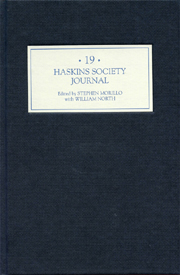Book contents
- Frontmatter
- Contents
- Editor's Note
- Abbreviations
- 1 King Harold's Daughter
- 2 The Anglo-Saxon Chronicles, Identity and the Making of England
- 3 Master Arnulf, Archdeacon of Rouen, Unlicensed Pluralism, and Idoneitas. Defining Eligibility in the Early Thirteenth Century
- 4 The Saint Zenobius Dossal by the Master of the Bigallo and the Cathedral Chapter of Florence
- 5 Discovering the Aquitanian Church in the Corpus of Ademar of Chabannes
- 6 Robert de Londres, Illegitimate Son of William, King of Scots, c.1170–1225
- 7 The Use of Naval Power in the Norman Conquest of Southern Italy and Sicily
- 8 Apology, Protest, and Suppression: Interpreting the Surrender of Caen (1105)
- 9 Henry Loyn and the Context of Anglo-Saxon England
6 - Robert de Londres, Illegitimate Son of William, King of Scots, c.1170–1225
Published online by Cambridge University Press: 12 September 2012
- Frontmatter
- Contents
- Editor's Note
- Abbreviations
- 1 King Harold's Daughter
- 2 The Anglo-Saxon Chronicles, Identity and the Making of England
- 3 Master Arnulf, Archdeacon of Rouen, Unlicensed Pluralism, and Idoneitas. Defining Eligibility in the Early Thirteenth Century
- 4 The Saint Zenobius Dossal by the Master of the Bigallo and the Cathedral Chapter of Florence
- 5 Discovering the Aquitanian Church in the Corpus of Ademar of Chabannes
- 6 Robert de Londres, Illegitimate Son of William, King of Scots, c.1170–1225
- 7 The Use of Naval Power in the Norman Conquest of Southern Italy and Sicily
- 8 Apology, Protest, and Suppression: Interpreting the Surrender of Caen (1105)
- 9 Henry Loyn and the Context of Anglo-Saxon England
Summary
Historians of twelfth-century Scotland have often used its individuals – even those at the highest echelons of society – to illustrate wider themes. Geoffrey Barrow was the pioneer of this approach to great effect: he used the careers of men such as John de Vaux, Robert de Quincy and Philip de Valognes to argue that the settlement in Scotland of men such as these was part of the transformation of Scotland during the twelfth and thirteenth centuries, a period dubbed by Barrow as the ‘Anglo-Norman Era in Scottish History’. Historians of Scotland during the central Middle Ages have long been aware that Robert de Londres, illegitimate son of William I, king of Scots from 1165 to 1214, was an important figure. Lord Hailes listed Robert first among William's illegitimate children in his Annals of Scotland, first published in 1776. Nevertheless, until Barrow's Anglo-Norman Era in Scottish History, published in 1980, little was known about Robert other than his existence. Barrow identified his mother's family and some of his landed possessions, thus justifying his calling Robert ‘the eldest and most favoured of William's bastard sons’. But despite such approbation, Robert has received no further attention since the publication of Barrow's Anglo-Norman Era. The lack of space devoted to him is no doubt the result of lack of evidence: although eleven of his acts survive (two as originals), these tell us little of his career and, to make matters worse, Robert appears in no narrative source of the period.
- Type
- Chapter
- Information
- The Haskins Society Journal 192007 - Studies in Medieval History, pp. 99 - 119Publisher: Boydell & BrewerPrint publication year: 2008



